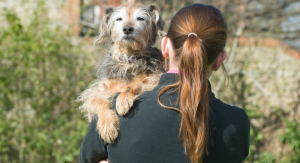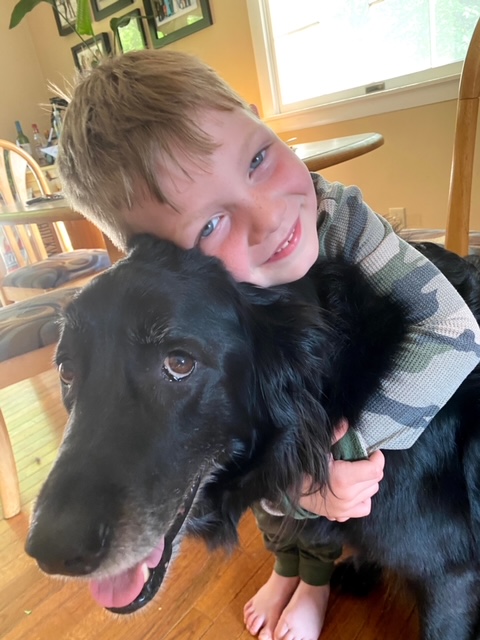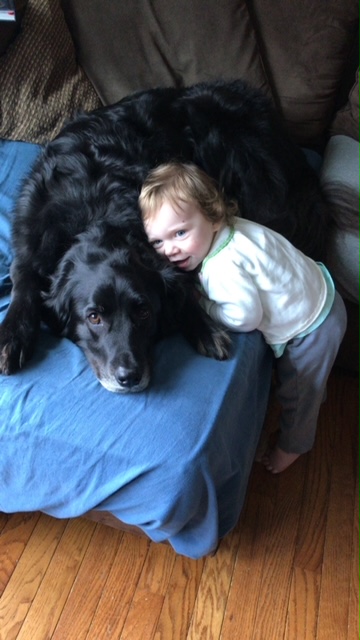I had to say goodbye to our family dog this week. Summit was eight years old and had been suffering from cancer for at least seven months. Leading up to the vet appointment to put her down, I told myself I’d be ok. I had plenty of time to prepare. In fact, I felt I’d started the grieving process back in July – when I realized that we had only a few months left. However, as it turned out, I hadn’t truly grieved. The loss hit me like a ton of bricks, and I found myself shocked by the magnitude of my sadness. I discovered losing a dog as a mom in my thirties is way harder than it was in my twenties.

I lost my beloved family dog, Dakota, in my twenties. He was literally my best friend. We went on daily walks, snuggled on the couch, and played fetch. I cried into his fur when I felt the world was unfair and he licked my face to show he cared. When he passed (also from cancer around the age of eight), I was devastated. Therefore, I felt “prepared” for the emotional reaction I’d have when it was Summit’s time to go. I was wrong. Where before I was sad, I’m now mourning. Is it because I got her as a puppy? Perhaps because she was my first “baby”?
Here are some reasons I think losing a dog as a Mom in my thirties is way harder than it was in my twenties.
Telling the kids: One of the most stressful parts leading up to losing Summit was the knowledge that we’d have to tell our young children. In addition to my own fears and grief, I had to take on the mental load of researching the best way of breaking this news. This worry made the end-of-life decision even harder.
Losing a part of the house: When I moved frequently from apartment to apartment in my twenties, I dragged my pets with me. However, Summit has always been part of our house. My husband and I got her right after our wedding and then soon moved to our current house. The day after she died, I was in shock. I literally had never been in the house without her. I continue to turn the corner and expect to see her lying in the hall, or hear her tags jingle to greet me when I come home from work.
Losing our protector: During much of the pandemic, my husband switched to second shift. This allowed us to have a parent home during the day in case daycare closed or a family member got sick. It also left me home alone every weeknight on our dark street. I never felt unsafe. I knew Summit was there to bark at every plastic bag blowing in the wind or stranger on the street.
Losing my outdoor companion: As her name implies, Summit was my hiking buddy. Whether it was a short, dog-friendly Seacoast hike, or a solo trek in the White Mountains, I got serious joy from watching her enjoy the trail even more than I did. Not only does the trail seem more ominous without my protector, but I’ve lost that boost of joy from watching her climb a peak. While I did enjoy the outdoors in my twenties, a walk with my dog was more of a chore. As a mom of little kids, a walk outdoors was the excuse I needed for a quick break from mom-life.
Losing part of my identity: A big part of the last decade has been identifying as a “dog mom”. Yet, with full time jobs, kids in school and activities, and long commutes – my husband and I decided getting another dog is not in the cards. At least not for awhile. Therefore, it’s not just my dog, pet, and friend I lost – it’s part of my identity as well. I was part of a tribe – dog-people. Now, I’m an ex-pat in the dog-mom community. It’s not a major thing, but it’s one more thing to grieve.




Advice for Losing a Pet As a Mom In Your Thirties
So what can we do? Well, my first instinct was to spend as much time out of the house where I didn’t need to feel her loss. However, that’s not very realistic (nor healthy). In addition, since pet loss can be especially difficult when young children are involved, it’s important to have a growth mindset when considering healing. Here are some tips that can help:
- Talk to your kids: Explain what has happened and answer their questions in a simple and age- appropriate way. My research suggested not stating that the pet has “gone to sleep” or “put to sleep” as it can cause fear and confusion with bedtime. We told our children Summit was “put down” and has died. Here’s an article sharing what’s appropriate at various ages.
- Allow your kids (and you) to grieve: Encourage your kids to express their emotions and feelings about the loss of your pet. It’s normal to feel a range of emotion. I’ve noticed that days later, my kids are starting to process the true loss of their family companion.
- Create a memorial: A special place or ritual to honor the pet allows kids to participate in the process. We plan to plant a special shrub or tree in our yard. We will sprinkle some ashes in the ground.
- Keep your routines: Maintaining a routine helps kids feel a sense of comfort and stability during this time.

Give It Time
I know that this process will take time. Shouldering the responsibility of being a parent to little kids while simultaneously saying goodbye to another “baby” of mine has made losing a dog as a mom in my thirties way harder than it was in my twenties. Still, I also feel blessed to have had a companion who left such a impact on my life.










